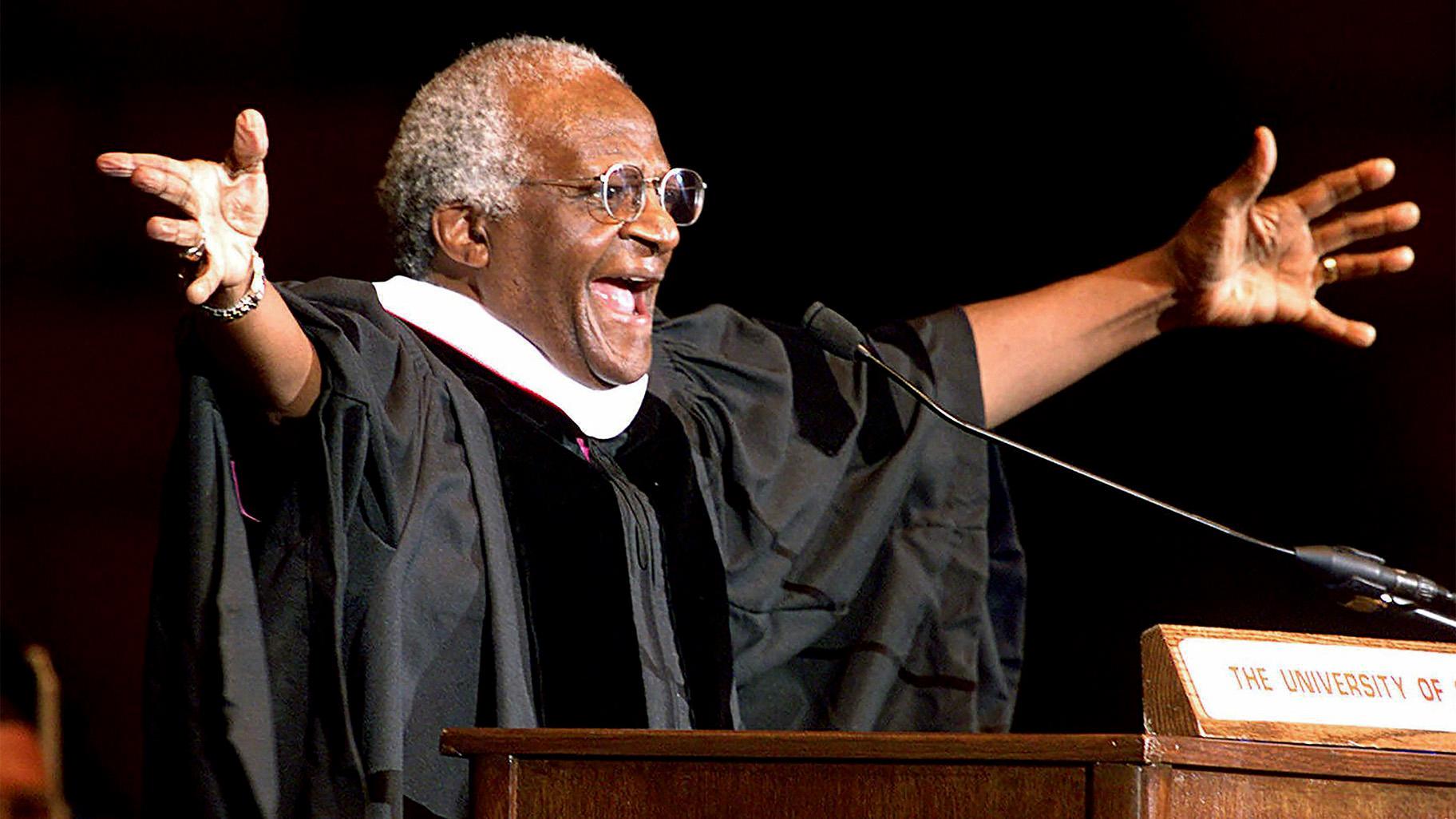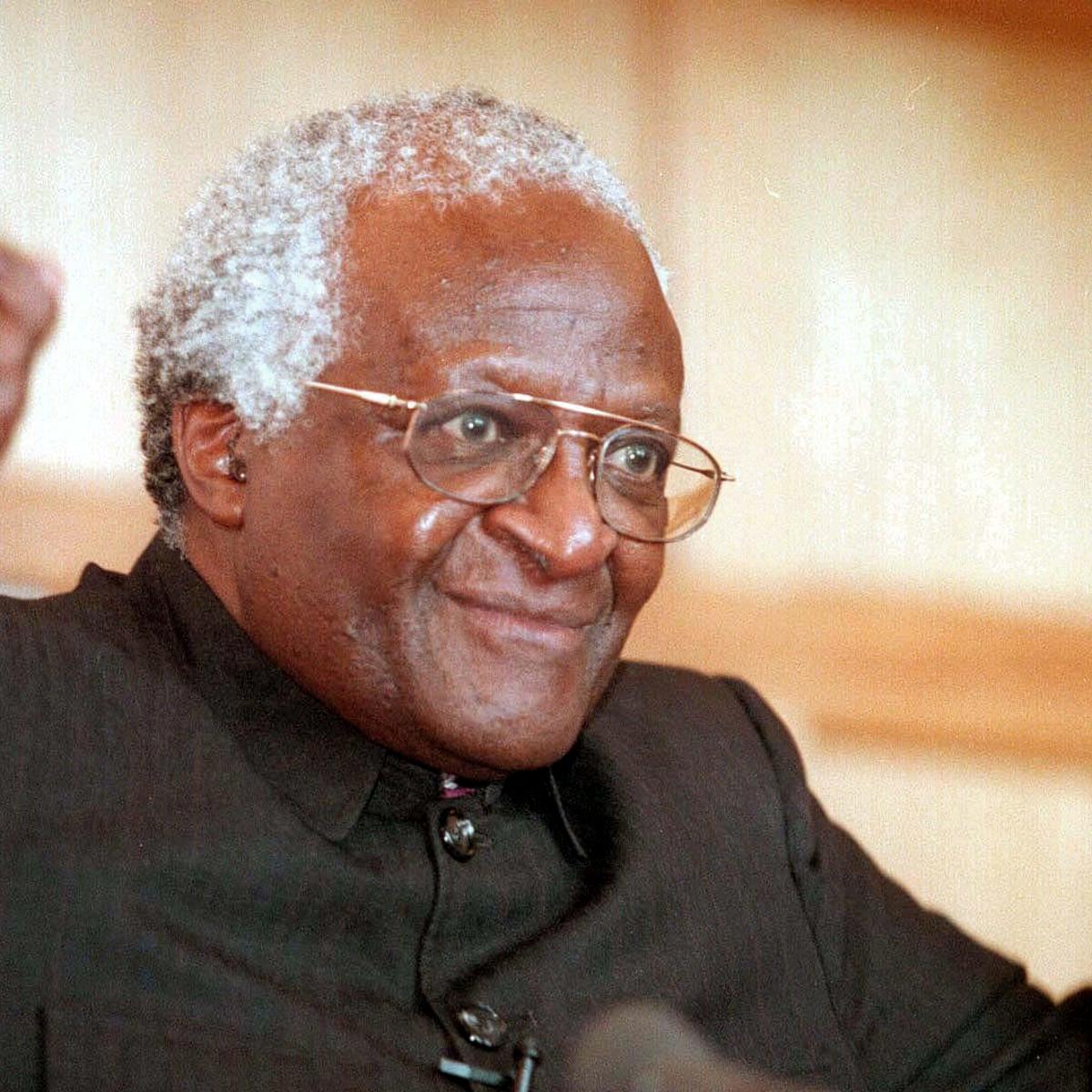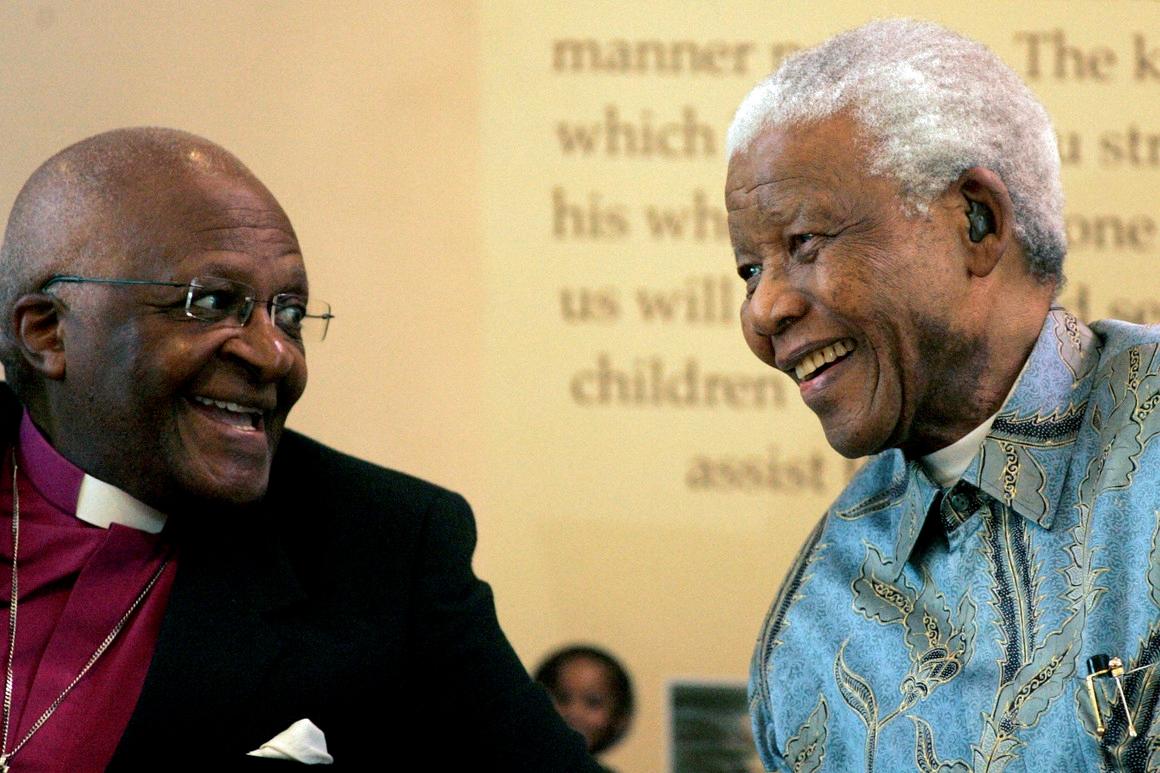Desmond Tutu was a South African Anglican cleric and social rights activist who became famous for his work as a leading anti-apartheid campaigner. Born on October 7th, 1931 in Klerksdorp, South Africa, Tutu grew up in a country that was deeply divided by racial discrimination and segregation policies.
Despite being born with a weak constitution, Tutu was a determined and ambitious child who excelled academically. He attended a local school in Johannesburg and later went on to study at the University of South Africa, where he obtained a Bachelor of Arts degree in theology.
After completing his studies, Tutu became a priest in 1960, and he quickly rose to prominence as a leading voice in the fight against apartheid. He was a key player in the movement for social justice and played a pivotal role in the struggle to end apartheid in South Africa.
Tutu’s most significant contributions to the movement were his calls for non-violent resistance and his advocacy for reconciliation and forgiveness. He believed that forgiveness was a powerful tool for healing and that it was essential for the country to move forward after years of racial oppression and discrimination.
In recognition of his work, Tutu was awarded the Nobel Peace Prize in 1984, becoming the first black South African to receive the prestigious award. His advocacy for human rights continued beond the end of apartheid, as he campaigned for the rights of women, children, and minorities.
Tutu was also an accomplished author, having written numerous books on social justice, faith, and forgiveness. He was a charismatic speaker who used his platform to promote love, peace, and unity.
Desmond Tutu passed away on September 26th, 2021, at the age of 90. His legacy as a tireless champion for human rights and social justice will continue to inspire generations to come.
Desmond Tutu was a remarkable humanitarian who dedicated his life to fighting for social justice, equality, and reconciliation. He was a beacon of hope for millions of people around the world, and his work will continue to inspire and motivate future generations to work towards a more just and equitable society.
The Suffering of Desmond Tutu
Desmond Tutu suffered from various health conditions throughout his life. As an infant, he contracted polio, which resulted in a permanently weakened right hand. In his teenage years, he battled tuberculosis, which left adhesions on his lungs. These health challenges could have potentially hindered his ability to live a normal life, yet Tutu persevered and went on to become a prominent figure in the fight against apartheid in South Africa. Despite his physical limitations, he lived his life with passion, courage, faith, and deep insight.
Source: news.wttw.com
The Inspiration Behind Desmond Tutu
Desmond Tutu was inspired by Christian moral teachings that emphasized the importance of love, compassion, and forgiveness. He believed that these values were essential for building a just and equitable society. As a religious leader, he used his platform to fight for social justice by advocating for reconciliation and forgiveness. Tutu believed that true reconciliation required acknowledging the pain and suffering of victims, holding perpetrators accountable for teir actions, and working towards healing and restoration. He also believed in the power of non-violent resistance and civil disobedience as a means of challenging unjust systems and social norms. Desmond Tutu was inspired by his faith to promote social justice and reconciliation and to work towards building a more peaceful and equitable world.
Desmond Tutu’s Values
Desmond Tutu was a prominent religious leader and human rights activist who was known for his strong values and beliefs. Throughout his life, he valued many things, including compassion, empathy, justice, and equality. Tutu firmly believed in the power of forgiveness and reconciliation, and he worked tirelessly to promote these values in his native South Africa and around the world.
Tutu was a strong advocate for human rights and social justice, and he was deeply committed to the struggle against apartheid in South Africa. He believed that all people, regardless of their race or background, shold be treated with dignity and respect. He was a vocal critic of oppression and discrimination in all its forms, and he worked to promote peace and reconciliation in the face of conflict and violence.
Tutu was also a strong believer in the power of education and the importance of empowering young people. He believed that education was the key to unlocking human potential and creating a brighter future for all people. Throughout his life, he worked to promote education and literacy, and he was a strong supporter of initiatives that aimed to improve access to education for underserved communities.
Tutu valued the importance of faith and spirituality in shaping human behavior and promoting social change. He believed that people of all faiths and backgrounds had a role to play in building a more just and peaceful world, and he worked to promote interfaith dialogue and understanding. Tutu’s values of compassion, justice, equality, education, and faith continue to inspire people around the world to this day.
Desmond Tutu’s Fight for Human Rights
Desmond Tutu was a prominent advocate for a wide range of human rights, both in South Africa and around the world. His most notable efforts focused on the fight against apartheid, a system of racial segregation and discrimination that was enforced by the South African government for many decades. As a key figure in the anti-apartheid movement, Tutu worked tirelessly to promote equality and justice for all South Africans, regardless of teir race or ethnicity.
In addition to his work against apartheid, Tutu was also a vocal advocate for other important human rights issues. He was a strong supporter of LGBTQ+ rights, and spoke out against discrimination and violence targeted at this community. He also worked to promote women’s rights, and was a vocal critic of gender-based violence and inequality.
Tutu was also a passionate supporter of freedom of speech and press freedom, and was a vocal opponent of censorship and government repression. He believed strongly in the right of all people to express themselves freely and to access information without fear of persecution.
Desmond Tutu’s work as a human rights activist was characterized by his unwavering commitment to justice, equality, and freedom for all people, regardless of their background or circumstances. Through his tireless advocacy, he helped to create a more just and equitable world for countless individuals and communities around the globe.
Desmond Tutu’s Fight for Equality
Desmond Tutu was a prominent figure in the fight for equality in South Africa. He fought against the oppressive apartheid regime, which institutionalized racial segregation and discrimination. Tutu used his voice as a powerful tool to speak out against the injustices faced by Black South Africans.
One of the ways Tutu fought for equality was by supporting the economic boycott of South Africa. He believed that the international community’s refusal to do business with the country would put pressure on the government to change its policies. Tutu also advocated for sanctions against the apartheid regime to isolate it from the rest of the world.
In addition to tese efforts, Tutu was a strong advocate for reconciliation between different factions associated with apartheid. He believed that forgiveness and understanding were necessary for South Africa to heal and move forward as a nation. Tutu played a key role in the Truth and Reconciliation Commission, which was established to investigate human rights violations during apartheid and promote healing and reconciliation.
Desmond Tutu fought for equality in South Africa by speaking out against injustice, supporting economic boycotts and sanctions, and promoting reconciliation and forgiveness. His legacy as a champion of human rights will continue to inspire generations to come.
Source: theguardian.com
The Qualities That Made Desmond Tutu an Effective Leader
Desmond Tutu is widely regarded as one of the greatest leaders of our time due to several factors. Firstly, his unwavering commitment to justice and equality for all, regardless of race or social status, has been a hallmark of his leadership philosophy. Throughout his career, Tutu has consistently rejected abuses of power and spoken out against injustice, earning him the respect and admiration of people across the world.
Another key aspect of Tutu’s leadership style is his ability to inspire and motivate others. His infectious enthusiasm and unwavering optimism have helped to galvanize people towards a common purpose, whether it be fighting apartheid in South Africa or promoting peace and reconciliation in other parts of the world.
Tutu’s leadership has also been characterized by his ability to build bridges and foster cooperation between different groups. He has been a champion of dialogue and reconciliation, encouraging people to listen to each other and work together towards common goals. This inclusive approach has helped to bring about meaningful change in South Africa and beyond.
Tutu’s leadership has been marked by his unwavering commitment to his values and principles. He has never compromised on his beliefs, even in the face of great adversity, and has always been willing to speak truth to power. This consistency and integrity have earned him the trust and respect of people across the world, making him a truly great leader.
The Contributions of Desmond Tutu to Building Democracy
Desmond Tutu played a crucial role in building democracy in South Africa and beyond. He was a prominent anti-apartheid activist, who fought against the oppressive system of racial segregation in South Africa. Tutu used peaceful means such as protests, boycotts, and strikes to challenge the apartheid regime. He also spoke out against the government’s human rights abuses, including the use of torture and violence against black South Africans.
Tutu’s efforts to build democracy did not end with the fall of apartheid. He continued to work for human rights and justice in South Africa and other parts of the world. He served as the chairperson of the Truth and Reconciliation Commission, which aimed to heal the wounds of apartheid by promoting forgiveness and reconciliation.
Tutu’s advocacy for democracy and human rights earned him numerous awards and honors, including the Nobel Peace Prize in 1984. He has also written severl books, including No Future without Forgiveness, which highlights the importance of forgiveness in building a peaceful and just society.
Desmond Tutu’s unwavering commitment to democracy and human rights has made a significant impact not only in South Africa but also in many other countries around the world.
The Peaceful Contributions of Desmond Tutu
Desmond Tutu is known for his unwavering commitment to peace and social justice. As an Anglican bishop in South Africa, he played a key role in the fight against apartheid. Tutu was a vocal critic of the government’s policies, and he helped to mobilize international support for the anti-apartheid movement.
Tutu was a leader of the Truth and Reconciliation Commission, which was established in post-apartheid South Africa to investigate human rights violations and promote healing and reconciliation. The commission providd a platform for victims and perpetrators of violence to tell their stories and seek forgiveness.
Tutu has also been a strong advocate for peace and reconciliation in other parts of the world, including Northern Ireland, the Middle East, and Rwanda. He has spoken out against violence and oppression, and has called for dialogue and understanding as a means of resolving conflicts.
Throughout his career, Tutu has emphasized the importance of compassion, forgiveness, and human dignity. He has worked tirelessly to promote these values, and has inspired countless individuals and communities to strive for peace and justice. Tutu’s legacy as a champion for peace and reconciliation continues to inspire people around the world.
The Impact of Desmond Tutu as a Role Model
Desmond Tutu is widely considered a positive role model due to his dedication to promoting social justice, equality, and peace. He has spent his entire life advocating for the rights of marginalized individuals and communities in South Africa and beyond. Tutu played a significant role in the anti-apartheid movement, and his leadership in the Truth and Reconciliation Commission helped heal South Africa’s deep social wounds.
Tutu’s commitment to non-violence, his unwavering faith in God, and his tireless advocacy for human rights have earned him global respect and admiration. He has received numerous awards and honors for his work, including the Nobel Peace Prize in 1984.
Moreover, Tutu’s message of love, compassion, and forgiveness has resonated with people of all ages and backgrounds, inspiring millions around the world to stand up against oppression, discrimination, and injustice. His teachings have been instrumental in promoting interfaith dialogue and understanding, and his legacy continues to inspire future generations to fight for a better world. In short, Desmond Tutu is undoubtedly a positive role model whose life and work serve as a shining examle of what it means to be a true leader and advocate for social change.
Source: politico.com
The Spiritual Significance of Tutu
Tutu is a spiritual concept that emphasizes the interconnectedness of all life and the importance of recognizing the divine spark within all beings. At its core, Tutu is rooted in the belief that God created all humans in his image and that this shared identity should lead to a deep respect for the dignity and worth of every individual. This spiritual perspective encourages a sense of community and encourages individuals to act with compassion and empathy towards others, recognizing that we are all part of a greater whole. Tutu also emphasizes the importance of forgiveness and reconciliation, as a means of healing relationships and restoring harmony within communities. Through its message of interconnectedness and shared identity, Tutu offers a powerful spiritual lens for understanding the world and our place within it.
Conclusion
Desmond Tutu was a remarkable figure who lived his life with passion, courage, and deep insight. Despite facing numerous health challenges from birth, he went on to becoe a revered religious leader who used his platform to advocate for social justice, reconciliation, and forgiveness. Tutu’s unwavering commitment to these values earned him worldwide recognition and admiration. His work had a significant impact, not just in his home country of South Africa, but around the world. Tutu’s legacy serves as an inspiration to many, as he showed that even in the face of adversity, it is possible to make a positive difference in the world.



